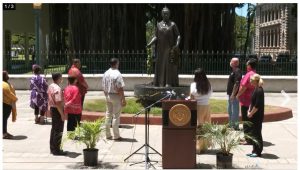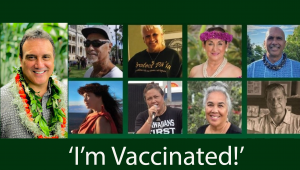Mythbusting in the pandemic and our kuleana
Posted on Sep 27, 2021 in Capitol Connection, Featured, MainWe’ve all heard the bizarre tales being spread over social media about COVID-19 vaccines — from microchips being implanted to people becoming magnetic — along with other rumors. That’s why Dr. Keawe Kaholokula, as chair of Native Hawaiian Health at UH Mānoa’s John A. Burns School of Medicine (JABSOM), worked with the Office of Hawaiian Affairs recently to publish “Mythbusting 10 Fears and Rumors about COVID Vaccination,” a list that takes a common-sense approach to vaccine hesitancy. His article is part of a special section in OHA’s Ka Wai Ola at https://kawaiola.news/category/covid-19/ to encourage people to get informed and vaccinated.
In the “Mythbusters” list, he urges people to talk to their family doctor, medical professionals or other credible sources rather than believing Internet trolls. “Definitely, the misinformation over social media is creating confusion and fueling people’s fears. But it’s bigger than that. It’s a mistrust of government,” he explained. “COVID-19 has really been an eye-opener for us in many ways, shining a light on health and social inequities. I remind people that as much as we’ve had issues in the past, government is also here to protect us. Government didn’t create these vaccines. They were created by the same companies who developed medication for diabetes and heart disease — drugs people are already taking. Government’s role is to make sure all people have access to the vaccines free of charge.” With the Delta variant surge, Native Hawaiians, Pacific Islanders and Filipino populations are showing higher numbers of COVID-19 cases — along with lower vaccination rates — according to Department of Health data. That concern led to an Aug. 26 news conference where leaders urged their lāhui (nation) to become informed and get vaccinated. “Many of our people are vulnerable to COVID because of pre-existing conditions,” Dr. Kaholokula explained. “We also may be essential workers with jobs that place us at risk and live in multi-generational households. If we did get COVID, we would be at higher risk for severe symptoms, hospitalizations and death.”

At the Aug. 26 news conference, Native Hawaiian leadership paid tribute to Queen Liliu‘okalani’s actions in 1881 to stop a smallpox epidemic and called for more people to get vaccinated against COVID-19.
As a clinical psychologist, Dr. Kaholokula draws on his professional training when he’s talking to vaccine skeptics. “People are tired of being told what to do. I don’t blame them; they’re frustrated. But it’s causing a rift in our community,” he said. “We know it’s not helpful to challenge or nag people if that makes them defensive and stronger in their position. Rather, I try to give people a chance to be heard and provide them with factual information so they can make up their own minds. I also say, at the very least, we have to help contain this virus by wearing our masks, physically distancing and avoid gathering.” What would he say to people who demonstrate with signs of “My body, my choice”? “Individual rights are fine, but when it infringes on the safety of others, it becomes an issue,“ said Dr. Kaholokula. “You’re forcing your choice on everyone you come in contact with. We have laws to regulate behavior that puts other people in danger. Also, if hospital beds are full, we cannot take care of everyone. Our healthcare workers are going to have to make critical, life and death decisions about who gets care and who doesn’t. Let’s not put our healthcare providers in that terrible situation.”
The 20 leaders at the Aug. 26 news conference — kumu hula, educators, health care professionals and public officials — drew parallels to smallpox epidemics and other foreign diseases that have devastated the Hawaiian community. They cited future Queen Liliu‘okalani’s decisive action, including a strict quarantine in 1881, to stop the spread of a smallpox epidemic in the kingdom. “What has made Hawai‘i special is we have this unique culture, this aloha spirit, we’re diverse, we got along,” Dr. Kaholokula said. “I wonder what happened in this pandemic? What we’re seeing is counter to all those things we’ve come to think about and value about Hawai‘i.”
